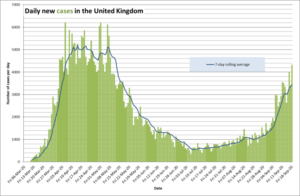As Britain braces for a second wave of the coronavirus infections, with several experts recommending another national lockdown, Sweden is the only country in Europe with a steady decline in the number of new cases being reported.
Both countries originally had a similar contingency plan in place, which included isolation for those especially vulnerable to the virus, caution for those with a slightly higher potential of being gravely ill and slightly restricted yet mostly normal way of life for younger people with healthy immune systems. The basis of this policy was an understanding of ‘herd immunity‘, which essentially allows for a sizeable non-risk group of the population to develop natural immunity by infection (asymptomatic in many cases with Covid-19) and recovery.

Source: Crep171166 with data from UK Government.
Licence: Contains public sector information licensed under the Open Government Licence v3.0
In the early days, seemingly, this policy was adopted by Her Majesty’s Government and plans were put in place to allow for it. Schools, daycare centres and universities were to remain open, while many vulnerable citizens across the country received self-isolation letters from the NHS. Dr Margaret Harris, a representative of the WHO, reportedly said: “We don’t know enough about the science of this virus. We can talk theories, but at the moment we are really facing a situation where we have got to look at action.”
Immense pressure was placed on the British Government’s posture by the international community of health experts employed by WHO. By this stage, however, the WHO was advising countries to impose lockdowns after failing to detect the impact of the virus in China, neglecting to control travel into and out of the country and issuing contrary notifications in rapid succession about measures that governments should adopt. In lieu of the bonafide medical expertise of the aforementioned scientists, the UK Government ordered a national lockdown in late March, with strict measures in place across the country.

On the other hand, the Scandinavian country of Sweden defied all international norms to carry on their cool and calculated approach under the leadership of Anders Tegnell, the national epidemiologist. At first, what seemed like an astronomical and uncontrolled rise was criticised, with several experts branding it a “cautionary tale”. Many people in care homes died across the nation in the UK, after people were discharged from hospital without checking for the disease. Currently, though, according to the Guardian, “While many European countries are seeing new cases surge to levels not seen since the peak of the Covid-19 pandemic, Sweden – whose light-touch approach has made it an international outlier – has one of the continent’s lowest infection rates.”

Source: South China Morning Post
Licence: News Broadcast Screenshot
Today, some experts in Britain are calling for another national lockdown, with the highest surge since May in parts of Scotland. Anders Tegnell, however, is seen as somewhat of a national hero. According to the Sun, while “panicked Britain locked down hard. Tegnell kept Sweden open — relying largely on public goodwill rather than tough new laws to fight the virus.” The public were politely asked to socially distance, not threatened with fines and medical expertise was not mixed with political clout. Tegnell said that shutting borders was “ridiculous” and that there is “very little evidence” that masks are effective.
Sweden has seen an average of only one death per day over the last ten days, and a total of only 82 deaths since the start of August.



